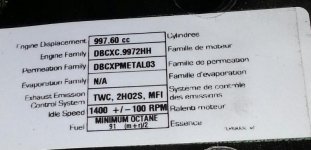OK. This tread got me to actually go read the info at the web site. Yep, from the first paragraph its absolutely snake oil. Look folks, anyone that leads their sales pitch with:
5 times the synthetic cylinder lubricant to reduce bore, ring & valve wear by up to 600% and valve recession by 360%
Is selling snake oil. It may have 5 times something (the claim does not say 5 times what) but it cannot reduce wear on anything by 600%. If you reduce wear by 100%, you have eliminated wear. What they are claiming is that it DEPOSITS 5 times what normal gasoline wears. Really? This is a good thing even if true?
Save your money folks. If there was some majic elixir that did all sorts of wonderful things in fuel, it would be marketed by major oil companies in brutal competition with each other. Come to think of it, there is one that works very well and is marketed and backed by lots of industry standard testing. Techron. Patented by Chevron does exactly what it says it will do. But it does not claim to raise octane 9 grades.
An ounce of anything simply cannot slow the rate of combustion (and burn cleanly enough) to raise the octane of six gallons gasoline from 87 to 96. Octane is raised by removing the light ends of the gasoline mix leaving the longer carbon chains. (overly simple description) but an additive simply cannot do this with the claimed effectiveness. The fast burning lighter carbon chains are still there.
County fair grade snake oil sales.....


